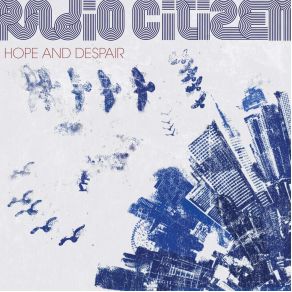Hope and Despair
Download links and information about Hope and Despair by Radio Citizen. This album was released in 2010 and it belongs to Ambient, Electronica, Jazz, Avant Garde Jazz, Dancefloor, Dance Pop genres. It contains 12 tracks with total duration of 52:39 minutes.

|
|
|---|---|
| Artist: | Radio Citizen |
| Release date: | 2010 |
| Genre: | Ambient, Electronica, Jazz, Avant Garde Jazz, Dancefloor, Dance Pop |
| Tracks: | 12 |
| Duration: | 52:39 |
| Buy it NOW at: | |
| Buy on iTunes $9.99 | |
| Buy on Amazon $7.99 | |
Tracks
[Edit]| No. | Title | Length |
|---|---|---|
| 1. | Test Me (feat. Ursula Rucker) | 4:52 |
| 2. | Skyscrapers | 4:23 |
| 3. | Summer Days (feat. Bajka) | 4:36 |
| 4. | World | 4:00 |
| 5. | Isarwellen | 4:27 |
| 6. | Hope (feat. Bajka) | 4:20 |
| 7. | Home | 3:15 |
| 8. | Thema | 4:14 |
| 9. | Move | 5:44 |
| 10. | Stop or Go (feat. Bajka) | 3:09 |
| 11. | Last Exit | 5:15 |
| 12. | Midnight | 4:24 |
Details
[Edit]Four years after Berlin Serengeti, composer/producer/multi-instrumentalist Niko Schabel resurrects Radio Citizen for Hope and Despair. The album builds on the esthetics of its predecessor and evolves in its sound toward a more provocative, aggressive, and ambitious result, driven incessantly by the force of upright bass. Strings, brass, reeds, and woodwinds are played and/or sonically manipulated across modal and stylistic lines through jazz, dub, funk, African, and Latin styles. Shimmering, dramatic strings and exotic percussion also color these proceedings with darker, irresistible textures. On "Test Me," Ursula Rucker's vocals are supported by a bassline that stretches the cut's time signature yet remains in the pocket; strings and winds create an atmospheric razor-wire that her delivery dances upon. The riveting contrabass that drives "Isarwellen" is juxtaposed with piano, Latin and African drumming, and a horn section that evokes both the late-'60s-era Gil Evans and Oliver Nelson. A Rhodes piano props itself under Bajka's voice on "Hope"; skittering cymbals and hi-hats pop on the one as her reedy soul vocal declares her determination. Bass and saxophones enter the middle and flood the space, making it a jazz-funk wonder. Contrast this to the breezy, slippery reggae in "Summer Days." Bajka lilting vocal rides atop a fingerpopping head nod of percussion and bass before reeds and winds stagger in on syncopated lines. The spooky, dub-heavy mix in "Home" relies on nocturnal ambience as keys, open space, scratched records, and white noise introduce a simple piano melody that seemingly arrives from the ether. "Move" utilizes Miles Davis' Bitches Brew's employment of distorted Rhodes and acoustic pianos that charge through the densely packed sonics and a driving rhythmic attack. Bajka's voice on "Stop or Go" grooves on the musical tightrope between modern club-soul and Getachew Mekuria's Ethiopian jazz. "Last Exit" uses strings in a cinematic manner without cliches. There's a weave of polyrhythms crackling on slow burn as the strings create a contrapuntal theme for the Rhodes; its tension is almost unbearable. Hope and Despair charts an ambitious course; its canny arrangements and deft, subtle, layered mixing create a muscular yet entrancingly mysterious group of tunes that, when taken together, is stunning in its depth and breadth. This is future music created by a journey through the past, and here it's disassembled and rebuilt, one groove at a time.